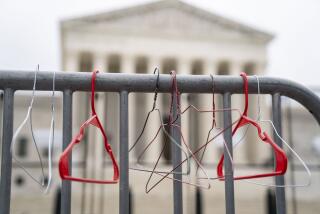Democratic Senators Block Pickering’s Confirmation
WASHINGTON — Citing civil rights concerns, Senate Democrats on Thursday blocked the confirmation of federal Judge Charles W. Pickering Sr. of Mississippi to an appellate court, marking the fourth time this year that one of President Bush’s judicial nominees has been stopped by filibuster.
Pickering’s allies fell six votes short of the 60 they needed to bust a Democratic filibuster and force a vote on his nomination. The 54-43 vote followed a short, bitter debate in which the judge’s supporters charged that he was being smeared and his critics said they were only protesting his record.
The vote came nearly two and a half years after President Bush tapped Pickering for a promotion to the U.S. 5th Circuit Court of Appeals in New Orleans.
The Senate has confirmed 166 federal judges during Bush’s presidency. But several of the president’s nominees have stalled amid an ideological battle over the judiciary.
Democrats say many of Bush’s choices, including those blocked by filibuster, are out of the legal mainstream on civil rights, abortion rights, consumer rights and other issues. Republicans say the Bush nominees represent top legal talent and that the president should be entitled to appoint judges who reflect his conservative philosophy.
In addition to Pickering, three other Bush nominees to appellate courts failed to overcome Democratic filibusters this year: Texas Supreme Court Justice Priscilla R. Owen, Alabama Atty. Gen. William H. Pryor Jr. and Washington, D.C., lawyer Miguel A. Estrada. Estrada, frustrated by more than two years in limbo without Senate action, asked Bush in September to withdraw his nomination for the U.S. Court of Appeals for the District of Columbia circuit.
The minority party may also use its blocking power in the Senate to thwart action on a handful of other appellate judicial nominees, including Los Angeles Superior Court Judge Carolyn B. Kuhl and California Supreme Court Justice Janice Rogers Brown.
Bush, appearing Thursday at a fund-raiser in Columbus, Ohio, did not refer directly to the Pickering vote. But he said that “every judicial nominee deserves a fair hearing and an up-or-down vote on the Senate floor.”
Thumping a lectern, he added: “It is time for some members of the United States Senate to stop playing politics with American justice!”
The Pickering vote came five days before a tight election for governor in Mississippi, timing that Republicans called coincidental.
Gov. Ronnie Musgrove and other statewide Democratic officials had endorsed Pickering, breaking ranks with Democrats in Washington. Pickering’s allies said Thursday that the Senate vote could inflame some Mississippi voters.
“A lot of people are going to be just generally mad,” said Sen. Trent Lott (R-Miss.), predicting that the anger may help Republican gubernatorial candidate Haley Barbour. Bush is scheduled to campaign for Barbour on Saturday.
Pickering drew opposition from supporters of civil rights, abortion rights and other causes. As evidence of his alleged insensitivity, critics cited his intervention to reduce a legally prescribed minimum sentence for a white man convicted of a 1994 cross burning. His allies argued just as fervently that Pickering was being unfairly maligned.
Sen. Thad Cochran (R-Miss.) implored Democrats to reconsider their opposition. He called the judge “above reproach, totally honest and honorable.” Cochran added: “The people who know Charles Pickering best are the residents of my state, and they overwhelmingly support his confirmation.”
But Sen. Edward M. Kennedy (D-Mass.) said Pickering would reverse progress on civil rights. “He has often been hostile to plaintiffs bringing civil rights claims,” Kennedy said, charging that the judge has “a disturbing record.”
Democrats voted in March 2002 to lock up Pickering’s nomination in committee. Republicans pushed for further action after gaining a majority in the Senate last January.
So far, there is little evidence that Republicans can muster the public pressure that it would take to force Democrats to abandon their blocking tactics on judicial nominees.
In fact, one Democrat who sided with Bush on the Estrada filibuster -- Sen. Bill Nelson of Florida -- opposed the president Thursday.
Explaining the discrepancy, Nelson said he believed he had assurances about Estrada’s evenhandedness that were missing in the case of Pickering.
At the same time, Pickering picked up support Thursday from a senator who had opposed Estrada: independent James M. Jeffords of Vermont. “I could find no reason not to vote for him,” Jeffords said, noting that a close friend had vouched for Pickering and called him “a fine, well-balanced judge.”
After the vote, Sen. Orrin G. Hatch (R-Utah) predicted that the Republican Senate majority would soon take steps to suppress the Democrats’ ability to use filibusters to thwart judicial nominees.
He said that the framers of the Constitution did not envision that a minority of senators would be able to block a nomination on the Senate floor.
Even if he fails to win confirmation, Pickering, 66, will remain a U.S. district judge, a position he has held since 1990.
Two Democrats broke ranks Thursday to support final action on Pickering: Sens. John B. Breaux of Louisiana and Zell Miller of Georgia. They joined Jeffords and all 51 Senate Republicans in backing Pickering.
Three Democrats did not vote: Sens. John F. Kerry of Massachusetts, John Edwards of North Carolina and Ben Nelson of Nebraska. Kerry and Edwards are 2004 presidential candidates.
Times staff writer Edwin Chen contributed to this report.
More to Read
Get the L.A. Times Politics newsletter
Deeply reported insights into legislation, politics and policy from Sacramento, Washington and beyond. In your inbox three times per week.
You may occasionally receive promotional content from the Los Angeles Times.










